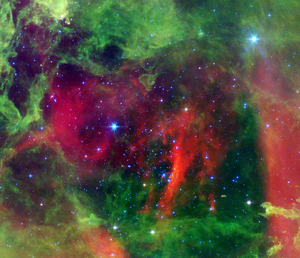February 8, 2008 feature
What Anthropic Reasoning Can Really Tell Us

Anthropic reasoning is under debate in the scientific community, and is considered by some as a cop-out. It has now lost further ground as physicists show that anthropic conclusions mostly reflect our biases rather than our knowledge.
Anthropic reasoning uses the fact that the universe seems fine-tuned to support life as we know it in order to explain various physical phenomena that are otherwise unexplained. And why is the universe fine-tuned to support life like us? Because, if it were otherwise, we wouldn't be here to observe it.
Case Western Reserve University physicists Irit Maor, Lawrence Krauss, and Glenn Starkman find this explanation troubling. As they write in a recent issue of Physical Review Letters, the anthropic principle is "based fundamentally on ignorance rather than knowledge." So they have tested the robustness of the anthropic explanation, stripping it down to its simplest scientific elements in order to determine what it truly can tell us about the universe we live in.
“In our work, we have tried to point out the hidden assumptions of anthropic reasoning: in a sense, you need to assume what you are trying to prove,” the three scientists told PhysOrg.com. “Moreover, we have provided a quantitative understanding of this issue.”
Importantly, anthropic reasoning implies that intelligent life requires the precise conditions found in our universe. For example, one of these conditions is the dominant contribution of something that acts like a cosmological constant (CC) to the energy density of the universe. Scientists have observed the CC to be not too large or too small that the universe would collapse or rip apart, but about right to allow matter to form galaxies and planets – a habitat for Earthly life. The anthropic explanation usually claims that life could not exist in a universe with other conditions, and therefore we would not be able to observe a different universe. However, the claim that life could not exist in a different universe is based on the assumption that we are a typical life form.
Maor, Krauss, and Starkman quantify how strongly anthropic arguments rely on the assumption that we are a typical life form. The researchers define a parameter space (a mathematically quantified collection) made of all possible universes with different CCs, and then try to determine a probability for life (either as we know it, or as we don't know it) within this collection. The problem here, they explain, is that we don't know what we can't observe, which leads to a sampling bias.
"As we are the only life-form and this is the only Universe we know, we have no information whatsoever about how Life extends over the rest of the parameter space," the researchers explain in their study. "It might spread over a wide range, implying life can take many forms, or it might require exactly the parameter values which lead to our life-form. . . . However, our limited data set of a single sample of a single point does not probe much of parameter space."
They come to the conclusion that, without the assumption of typicality, the connection between the value of the CC and the existence of life cannot be established, and therefore the existence of life cannot explain the CC’s special value.
"We can say that our existence is a good indicator of the observed CC," they conclude, emphasizing that correlation is far from causation. "The correlations illuminated by our limited anthropic understanding imply that what we ultimately learn from these arguments is that the existence of us and the existence of the observed value of the CC do not contradict each other. That is nice, but hardly surprising."
Unfortunately, the Case researchers and others still have more work to do before anthropic reasoning can successfully be dismissed as an explanation for why the all the parameters of our universe are such that it can support life.
“This debate is a complex one, and is not likely to be settled quickly because it is quite interdisciplinary,” the researchers explain. “It involves questions about the philosophy and methodology behind science, as well as questions about the actual observations and the mathematics used to analyze them. Moreover, as we state in the paper, the controversy stems, in large part, from our ignorance. We will need to learn more about the universe, and the fundamental laws governing it, before we can truly address some of these issues in an unambiguous way.”
Still, there is no guarantee that a fundamental explanation for these questions even exists. This may be one “why?” that can’t be answered in a definitive manner.
“Fundamental physics may or may not provide an explanation of the particular values of our universe's life-supporting parameters,” the researchers explain. “We may discover that the question ‘why is the mass of the proton 2000 times the mass of the electron?’ (which is essential for our exact form of life) is more like ‘why is the radius of Jupiter's orbit around the sun 5 times the radius of Earth's?’ than like ‘why does water expand when frozen?’ – a matter of probability rather than fundamental.
“However, we shouldn't assume that no explanation exists just because we don't yet know one, and, consequently, we should keep looking for an explanation at least until we have a convincing scientific theory that explains many other things and within which one can show that it is impossible to provide an explanation. The most interesting thing is that – unless we do discover a theory of everything – we will not know what is left to discover, which makes the search exciting.”
More information: Maor, Irit, Krauss, Lawrence, and Starkman, Glenn. "Anthropic Arguments and the Cosmological Constant, with and without the Assumption of Typicality," Physical Review Letters 100, 041301 (2008).
Copyright 2008 PhysOrg.com.
All rights reserved. This material may not be published, broadcast, rewritten or redistributed in whole or part without the express written permission of PhysOrg.com.





















